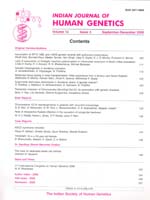
|
Indian Journal of Human Genetics
Medknow Publications on behalf of Indian Society of Human Genetics
ISSN: 0971-6866 EISSN: 1998-362x
Vol. 11, Num. 3, 2005, pp. 119-120
|
Indian Journal of Human Genetics, Vol. 11, No. 3, September-December, 2005, pp. 119-120
Editorial
"Jack of all trades"-editors of medical journals in India
Ghosh K
Institute of Immunohaematology, 13th floor, NMS building, KEM Hospital, Parel, Mumbai-400 012
Correspondence Address: K. Ghosh, Institute of Immunohaematology, 13th floor, NMS building, KEM Hospital, Parel, Mumbai-400
012. E-mail: kanjakshaghosh@hotmail.com
Code Number: hg05023
Editing a scientific journal was never easy. One has to find out a golden optimum of a mixture of original articles, review articles, short reports, case reports, hypotheses, letters to editor & so on. It is not enough to find out the optimum blend of various articles; page constraints may force an editor to choose a few short articles over long articles. For International journals and even for Indian Journals, the linguistic flavour of the article remains occasionally a source of pure delight or sometimes a cause for grave concern. Then comes conducting inhouse review and peer review. Those articles which are rejected at the level of in house reviews do not progress any further but those which are to be sent for peer review also tax editorial boards ingenuity. Finding a suitable peer reviewer for an article is a kind of detective work, starting from the word of month, national and international standing of the reviewer, his or her own work in the field need to be considered. A scientist who is a good worker in his/her own field need not be a good reviewer, where as a large reader of a scientific journal can be a good critic as exemplified by a famous critic of international cricket, Sir Nevil Cardus who played a ball in the field. Editors of medical Journals rely more on scientific peers rather than lay readers. May be the editor himself and some of his inhouse assistants, associate editors do the job of lay readers to understand the overall presentation of the article.
It is not always an easy job to get peer reviewers comment back in time. Peer reviewers are often busy and they do a yeomans service to science by reviewing the articles. In a way they are the watchdogs of scientific propriety. Hence an editor needs all the skills of a good manager to interact with the learned peer reviewers.
It is always difficult to tell somebody that his/her submission did not meet the criteria of the journal. The editors of different famous international journals have their own way to communicate this sad information to the writers.
You may ask what is new about the editors doing all the above mentioned jobs, as it is part and parcel of their job profile. But Indian editors have to do much more; they have to find out good contributors of articles to the journal, coax them, cajole them to submit an article. Indian editor has to find out a good printer who will not do a messy job and above all he/she also has to find out enough fund to run the journal smoothly. Correcting the language of the article, copy editing the journal also comes under Indian editors job description.
In these days of specialisation Indian Editors stand alike admirable crictitons, the Jack of all trades!
Now why I am writing all these today! My previous editor, Dr. Dipika Mohanty, Director of the Institute of Immunohaematology did this job admirable. She took up the responsibility of making the official journal of Indian Society of Human Genetics i.e. "Indian Journal of Human Genetics" into a Journal for international readership. To this end she got this journal indexed in Excerpta Medica Ind Med.
All these she accomplished with super human effort and always with a smile. Still we have a long way to go. After taking over as the editor of this journal, I feel it to be a great responsibility and a sacred responsibility too. I cannot do it along but with the help of all the august members of this society we are sure to put this journal in the international map. I request you all to join this sacred work of building up this Journal to its international status.
The perspective of the journal will not change. Human genetics is the core subject to which this journal is dedicated to. But the goal of understanding the genetic processes which make ourselves human morphologically and intellectually may start from diverse sources e.g. ontogecy, phylogency, embryology, population genetics, genomics, transgenics etc. Hence the spectrum of research work which can be submitted in this research work is broad.
Like a converging service in mathematics, informations from all these diverse sources can be collated, debated and eventually they give us a glimpse on the building blocks which in its complex concatenation makes us "Human".
Copyright 2005 - Indian Journal of Human Genetics
| 